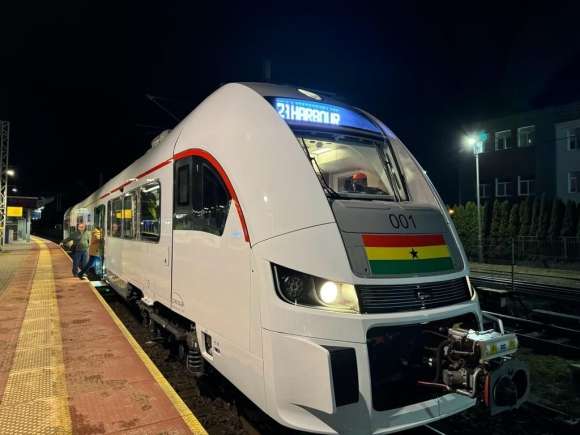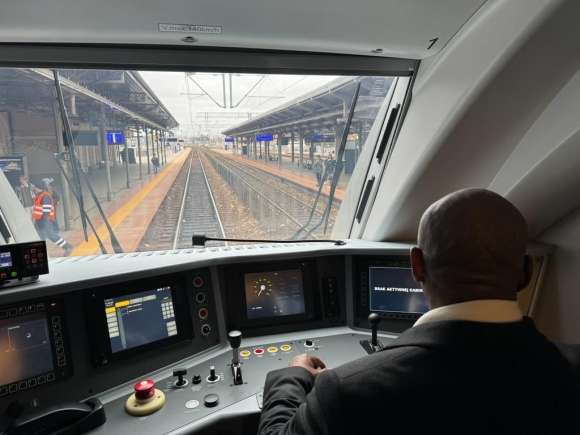The new train assembled in Poland for railway transportation in Ghana has been handed over to the Ghana government at a ceremony in Poland.
This is the first batch of 12 state-of-the-art trains from Poland, marking a pivotal moment for Ghana’s transportation sector.
It will be used on the new Tema-Mpakadan standard-gauge railway line.
It will transport passengers from Mpakadan through Kpong, Juapong, Doryumu all the way to Tema port and then the passengers can switch from the standard-guage line to a narrow-gauge line to take them all the way to the heart of Accra.
The Tema-Mpakadan railway line is a 97 km standard-gauge railroad constructed from Tema to Mpakadan to facilitate the movement of goods and people along the Eastern corridor of Ghana.
It complements and forms part of the multi transport system from the Tema port to the southern part of Ghana and to the inland port in the northern part of Ghana.
The development of that railway line is about 98 percent complete and it will be completed in 2024.
The line is part of a planned 1000 km Ghana-Burkina Faso interconnectivity project, which will connect Ouagadougou to the Port in Tema.
Arrival of train in Ghana
The first train, designed to operate seamlessly on both regional and long-distance lines is expected in Ghana by the middle of March 2024.
This is the first ever standard-gauge procured by the government of Ghana for operations in Ghana.
The handing over ceremony was done in Poland on Friday, February 2, 2024.
The expectation is that the train will leave Poland sometime in the middle of February 2024 with a transportation period of about four weeks and get to Ghana in the middle of March.
It will then go through system testing, close all the gaps, do some trial runs and then will be ready for commissioning by the President sometime in June 2024.
Handing over ceremony
At the handing over ceremony in Poland last Friday [Feb 2, 2024] by the Polish manufacturer, PESA, the CEO of the Ghana Railways Development Authority, Yaw Owusu said “there is no country that has developed or industrialised without a vibrant, efficient railway system. So Ghana, we are on our long journey, basically to ensure that we can accomplish our goal to build a network of 4000km of railway network across the country to assist us with the industrialisation agenda.”
He said, “especially for the current President, His Excellency Nana Addo Dankwa Akufo-Addo, whose plan is to revamp the railway system, this is such a wonderful day. It is a great milestone of achievement for the sector and also for the country. This will be the first time that we are bringing standard-guage railway system to Ghana. The original trains that we have were all narrow-gauge, so this will be the first standard-guage rolling stock in Ghana.”
After trying the train, Mr Owusu said it was “such a wonderful experience.”
He said the key is to “ensure consistent and persistent maintenance so that the train can last longer. These trains are built for 30 years and beyond.
“We in Ghana are looking for a long term relationship with PESA for future businesses because we believe PESA has what it takes to be able to continue to support Ghana Railway network.
He explained Ghana has signed an agreement with PESA for 5 years and hoping to extend the maintenance period to 10 years to ensure “this train will last longer for the people of Ghana.”
“We encourage the Ghanaian public to patronise the use of trains,” he added.
Procurement of trains
The procurement of these modern trains is part of a comprehensive framework contract between Ghana Railways and the Polish manufacturer, with the option for the ordering party to include an additional 10 vehicles in the future.
The technical specifications of these diesel multiple units align closely with the renowned RegioFox vehicles produced by Bydgoszcz for Czech Railways.
This strategic move by Ghana Railways underscores the Ghana government’s commitment to enhancing the rail network’s efficiency and capacity. The introduction of these modern trains is expected to elevate the overall passenger experience and contribute to the economic development served by the railway network.
As the transportation landscape in Ghana evolves, the arrival of these modern trains symbolises a promising era for Ghana’s rail sector, bringing with it the potential for improved connectivity, efficiency, and economic growth.









































